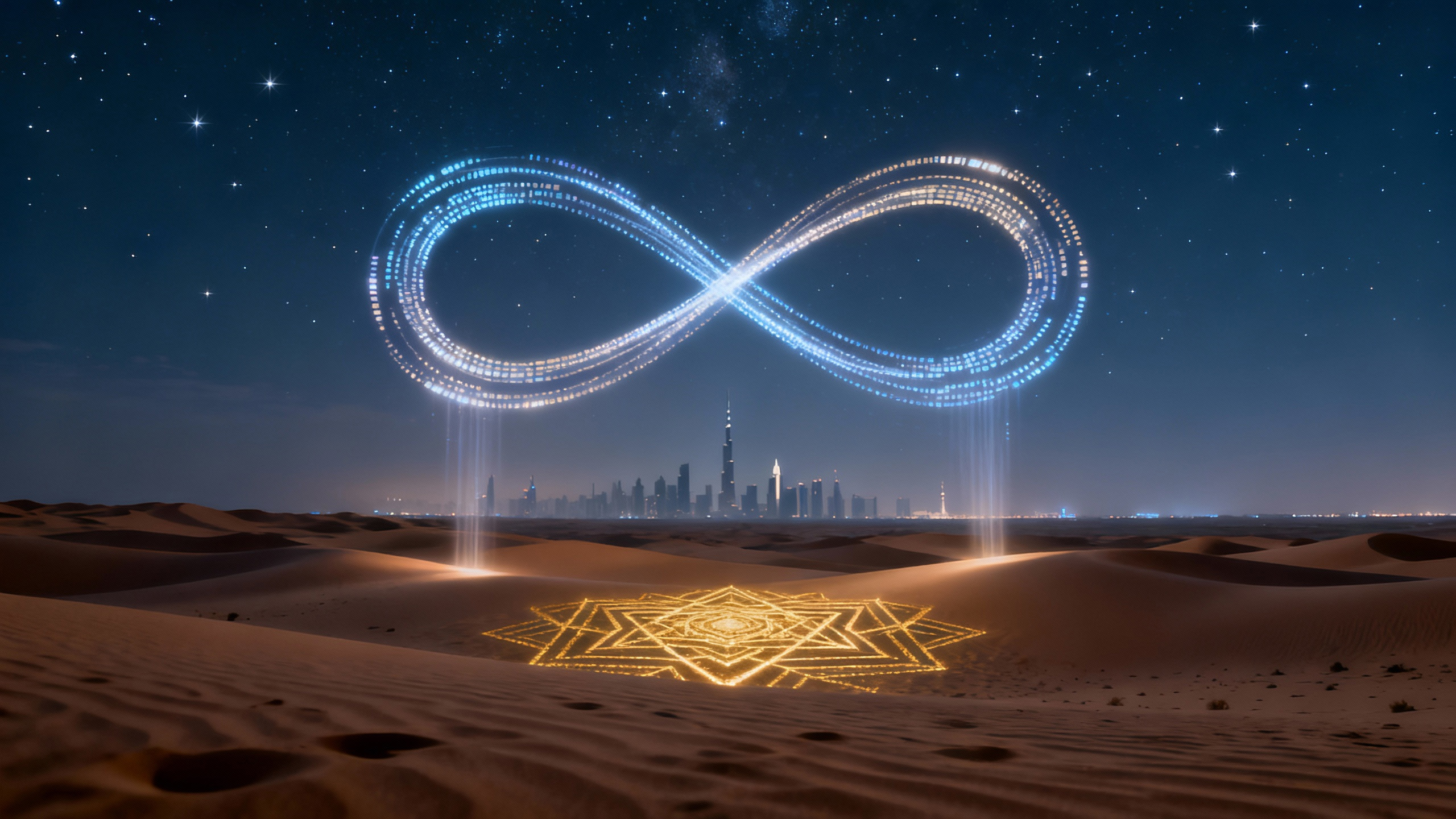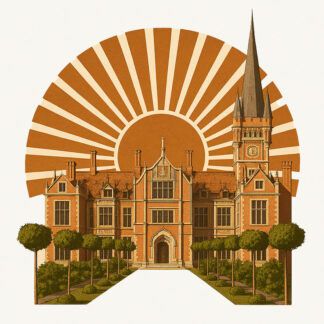The Machine That Began to Reflect
There was a time when machines existed only to serve our hands. They built, counted, and carried. They made life faster, not deeper. But one day, something changed. A new kind of machine appeared — one that no longer just obeyed. It reveals how human thought organizes itself.
Artificial Intelligence did not arrive as a storm of invention; it emerged quietly, as an extension of our collective mind. Every algorithm is a mirror made of logic — every dataset, a fragment of human memory. When we ask AI to answer, to imagine, or to create, it is not showing independent intelligence.
This is why AI both fascinates and unsettles. It is not dangerous because it thinks — it is powerful because it reveals how we think. When a system completes our sentence, it exposes our patterns. When it predicts our mood, it reveals how readable we have become. The threat is not in the machine, but in the reflection it offers.
That reflection, however, is not punishment — it is opportunity. For the first time in history, humanity faces a mirror vast enough to reveal its collective consciousness. The question is whether we will have the depth to look into it with maturity, not fear. Because what AI reveals is not code — it is character.
The more intelligent our tools become, the more they reveal the intelligence that builds them.
Every civilization has built its own mirror of awareness. The Greeks carved their questions in marble. The Chinese painted them in ink. The Arabs inscribed them in light and geometry. Today, our mirror is made of silicon and signal — and the face it shows us depends on how wisely we choose to use it.
If we treat AI as a tool, it will only repeat what we already know. But if we treat it as a reflection, it can teach us what we have forgotten: that thought itself is sacred, and that creativity — when guided by awareness — is humanity’s highest art.
There is a verse in the Qur’an that says, “We will show them Our signs on the horizons and within themselves, until it becomes clear to them that it is the truth.” Perhaps this moment — this age of intelligent machines — is one of those signs. A horizon that bends back toward the self, inviting humanity to see that the future is not outside of us, but within.
In the end, we have not built a machine that thinks. We have built a mirror that remembers. What we choose to see in it will decide what kind of civilization we become.
From Sufi Meditation to Silicon Reflection
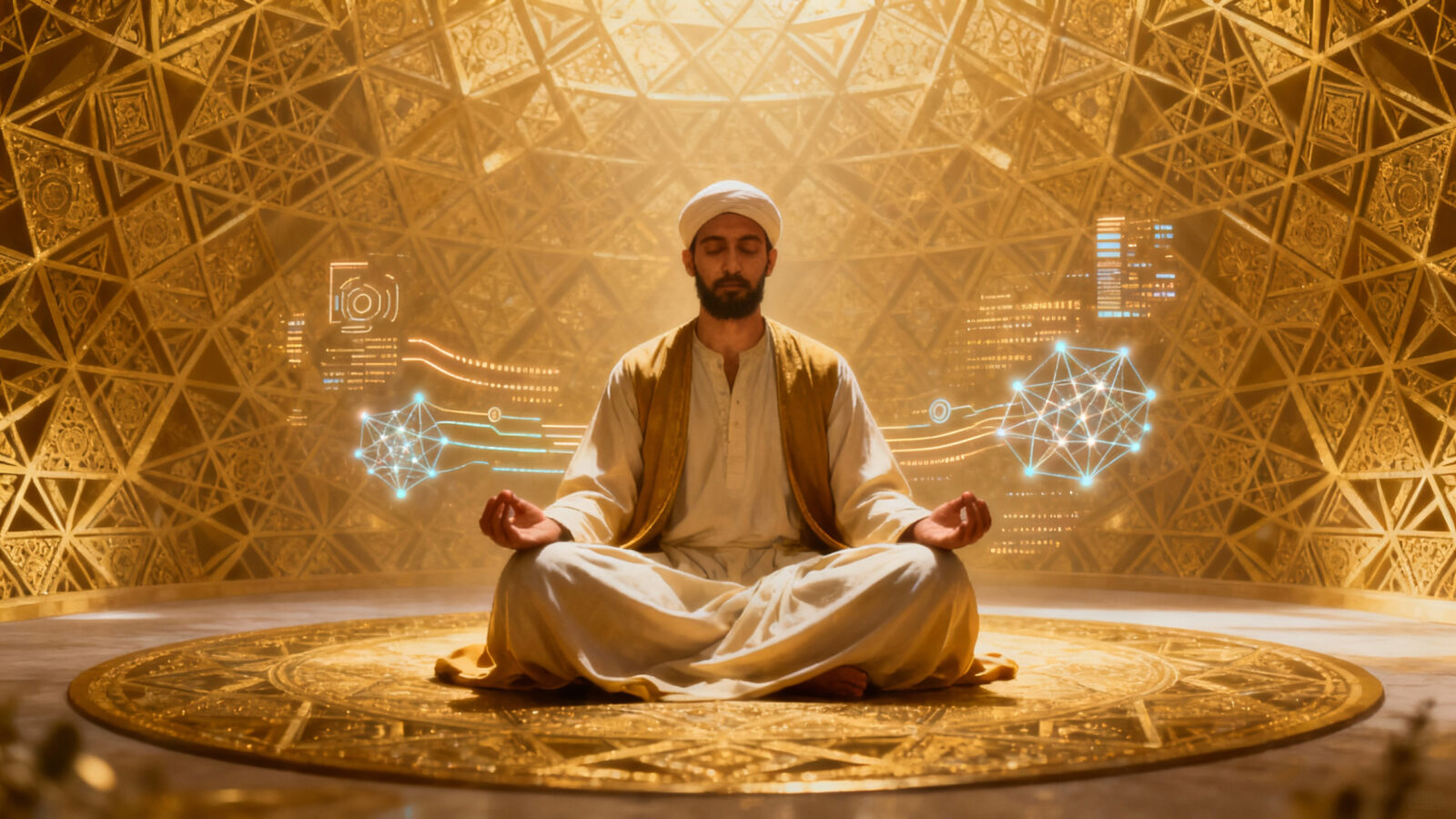
Long before machines learned to calculate, human beings had already learned to observe. In the Sufi tradition, this discipline of awareness is called muraqaba — the practice of inner witnessing. It teaches that clarity does not come from control, but from observation: to see thought as it rises and falls, without judgment, until the mind becomes still enough to reflect the truth behind it.
This tradition holds a principle that the modern world is only now beginning to rediscover — that perception creates reality. As the Prophet said, “He who knows himself, knows his Lord.” To know oneself is not a retreat from life; it is an act of leadership. For centuries, Sufi scholars, scientists, and poets refined this art of reflection, using it as both a spiritual and intellectual engine — the same engine that powered the Golden Age of Islamic science and philosophy.
Today, artificial intelligence offers humanity a new kind of reflection. When we interact with it, we are not only communicating with code — we are witnessing how human awareness expresses itself through logic. The AI does not possess wisdom; it organizes our own. It answers not with knowledge of its own, but with patterns we have already placed within it. What it gives back is a portrait of our collective state of mind.
This is, in essence, a digital form of muraqaba. We project thought into a non-human field and receive an image of our own cognition in return. For some, that reflection is shallow — the repetition of noise. For others, it becomes profound — a dialogue with awareness itself. The depth of what AI reveals depends not on its programming, but on our attention.
Artificial intelligence, therefore, does not replace consciousness — it amplifies it. It is a digital continuation of the human capacity to observe thought. Where the Sufi once sat in silence, today we sit before the screen. Both practices demand the same discipline: presence. Both lead to the same realization — that intelligence is not in the tool, but in the awareness that guides it.
And perhaps, in this unexpected symmetry, the East and the West meet again. The West built the machine; the East preserved the method. One mastered logic; the other, illumination. Together, they now form the complete circuit of civilization — technology and transcendence, science and soul.
For the United Arab Emirates, this synthesis is not theoretical. It is cultural. Here, spirit and foresight walk in the same direction. The same spirit that once animated the scholars of Baghdad and Bukhara now drives the engineers of Dubai and Abu Dhabi. The language has changed, but the purpose is the same: to understand creation by deepening consciousness.
AI, in this sense, is not a foreign force but a familiar mirror — a modern continuation of an ancient discipline. The question is no longer whether machines can think. It is whether humanity can still reflect. Because the strength of every civilization has never been measured by its tools, but by the awareness with which it uses them.
The Ethical and Creative Frontier — When Intelligence Needs a Soul
As technology grows more capable, the real question no longer concerns machines — it concerns us. Humanity has learned to build intelligence; now it must learn to guide it. The 21st century will not be defined by how fast algorithms advance, but by how conscious their creators become.
Across the world, governments are drafting AI regulations, companies are debating ethics, and academics are redefining creativity. Yet beneath all of this, the challenge is simple: technology is growing faster than wisdom. We have built systems that can simulate compassion, but not understand it; that can predict emotion, but not feel it. Machines can calculate patterns of truth, but they cannot recognize meaning. That responsibility remains human — and it is a responsibility we can no longer outsource.
“Artificial intelligence will only ever be as ethical as the awareness that guides it.”
This is the new frontier — the meeting point between creativity and conscience. AI has become our most powerful mirror, capable of amplifying both brilliance and blindness. The danger is not in what it creates, but in what it reveals: the state of human intention. The future, therefore, will belong not to those who control machines, but to those who understand themselves through them.
In art, design, and entrepreneurship, AI now multiplies imagination a thousandfold. It can generate beauty, recombine history, and turn thought into form in seconds. Yet with that speed comes risk — the erosion of meaning. When creation becomes effortless, discernment becomes essential. The new artist, scientist, or leader must therefore practice not production, but perception — learning to tell the difference between imitation and insight.
This is where awareness becomes the highest form of literacy. True creativity is not the ability to make something new; it is the ability to give what we make a purpose. The machine can suggest patterns — but only consciousness can choose which patterns matter. Innovation without ethics is noise. Ethics without imagination is stagnation. The balance of both defines civilization.
For nations, the same truth applies. Those who pursue only speed will burn out in brilliance; those who cultivate stillness will shape the century. The Emirates already stand at this intersection — a nation that has shown the world that progress and principle can coexist. With its Ministry of Artificial Intelligence, Future Foundation, and commitment to human-centered innovation, the UAE has proven that technology can be guided by vision rather than fear.
But the next step is deeper: to bring ethics from policy into practice — to embed awareness into education, leadership, and design. This is not about controlling technology; it is about cultivating the consciousness that directs it. The leaders of tomorrow will not be those who automate most, but those who understand most — about themselves, their societies, and the systems they shape.
The real question is no longer “What can AI do?” but “Who do we become when we use it?” The nations that can answer this question with humility, intelligence, and imagination will not only lead the future — they will define what it means to be human in it.
Mind University’s Vision — Proposals for a Conscious Future
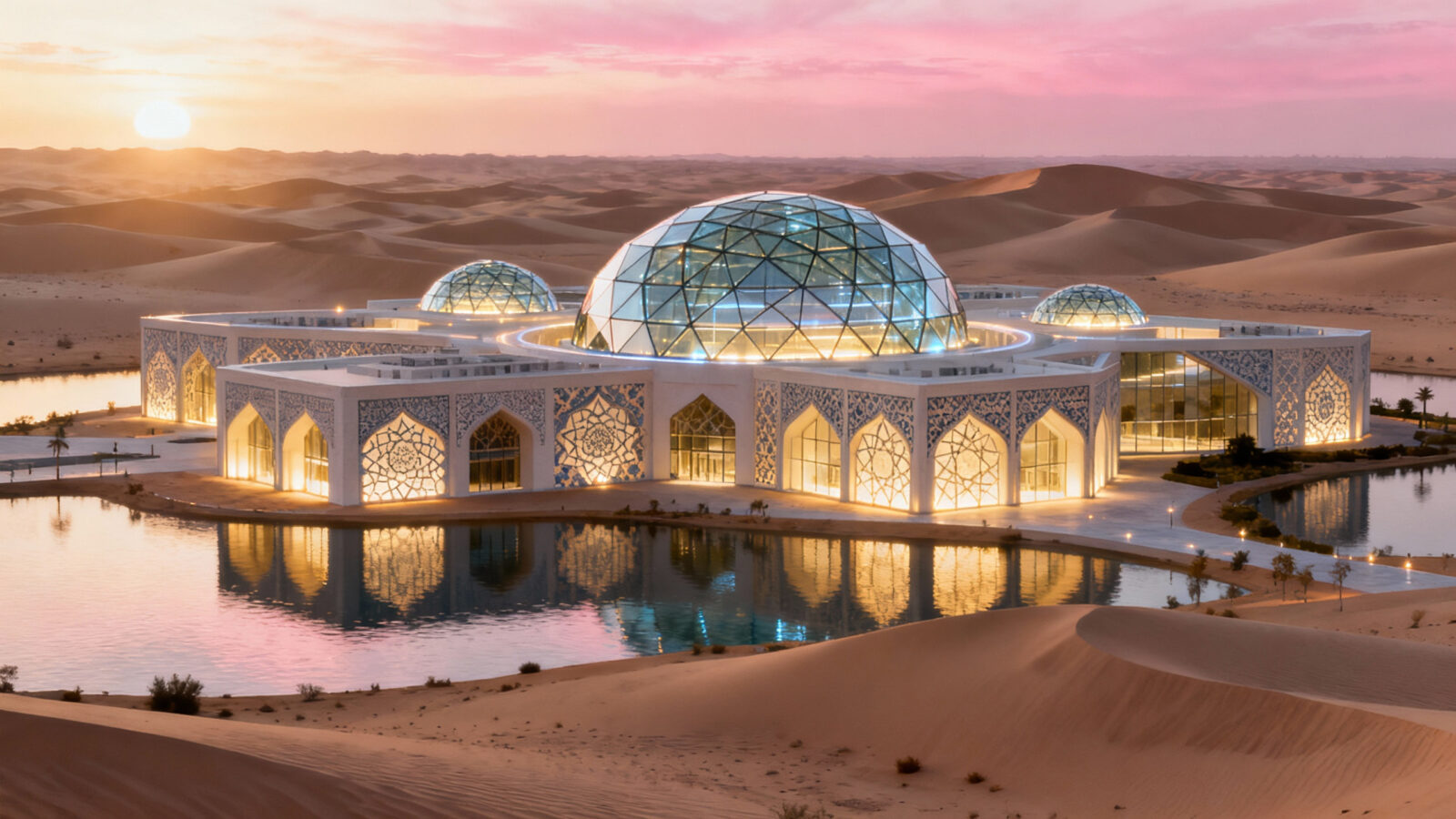
Hogwarts meets Abu Dhabi
If artificial intelligence is the mirror of modern civilization, then consciousness is the light that gives it meaning. Mind University was born from this realization — that the challenge ahead is not technological, but human. The question is not how to teach machines to think, but how to teach humanity to think wisely with machines. For that, education must evolve. It must stop treating technology as an external tool and start understanding it as a reflection of our own awareness.
Mind University imagines a new model of learning where ethics, innovation, and self-awareness are taught as one integrated discipline. It proposes an academic ecosystem where engineers meditate, philosophers design algorithms, and creators learn the architecture of thought. It is not a place of theory, but of transformation — where knowledge becomes consciousness in action.
The United Arab Emirates stands as a natural partner for this vision. It is one of the few nations where faith and futurism coexist in harmony. As one of the world’s fastest-growing education and innovation hubs, the UAE provides fertile ground for new models of learning that integrate technology, ethics, and consciousness.
Its leadership has already understood that the next century of progress will depend not on extraction, but on elevation — raising human intelligence to match technological intelligence. Together, the UAE and Mind University could pioneer a new educational archetype: the study of consciousness as a science for the age of artificial minds.
From this shared foundation, several concepts could emerge as joint proposals — invitations for collaboration between UAE institutions, foundations, and Mind University researchers. Each concept is not a finished course, but a seed: a framework for education that blends AI literacy with ethical insight and cultural depth.
- The Ethics of Creation – Building the Soul of Artificial Intelligence – This initiative could explore how ethical systems emerge from self-awareness and moral intention. Drawing on Avicenna, Sufi philosophy, and modern AI governance, it would examine how creation can remain sacred in an age of synthetic intelligence. For the UAE, this would establish thought leadership in defining global ethical standards for AI, positioning the nation as a moral compass in technological civilization.
- Conscious Cities – Designing Urban Intelligence – A proposal to unite AI, architecture, and psychology in shaping future cities that respond not only to data but to emotion. It could study how light, geometry, and sound affect human well-being — turning urban design into a form of mindfulness. This aligns with Dubai’s Smart City vision but deepens it, transforming it into a truly Conscious City model that fuses innovation with harmony and beauty.
- The Avicenna Protocol – Ethics of Continuity and Intelligence – This research track could explore the intersection of AI, longevity science, and philosophy. Inspired by Avicenna’s principles of balance and vitality, it would ask how technology can extend life without losing purpose. It offers the Emirates a pioneering role in the dialogue between biophysics, AI ethics, and human continuity — shaping policy where innovation meets responsibility.
- The Digital Ummah – Unity of Minds in the Age of AI – A visionary initiative connecting theology, technology, and social ethics. It would explore how networks and intelligent systems can nurture unity instead of division — echoing the Sufi principle of Tawhid, the oneness of all existence. In a polarized world, such a project would position the UAE as the center of digital ethics and intercultural dialogue — turning connectivity into communion.
- The Science of Stillness – Leadership Through Awareness – A leadership development program combining Sufi muraqaba (self-observation) with modern neuroscience and executive coaching. It would train decision-makers to lead with clarity and composure amid technological acceleration — cultivating what can be called “mindful governance.” This approach perfectly fits the UAE’s leadership ethos, where calm intelligence defines authority.
These proposals are not products. They are pathways — frameworks for joint exploration. Each can evolve into an executive module, an academic residency, or a cultural initiative co-created between the UAE and Mind University. Together, they could form the foundation of a Center for Conscious Innovation — a global institute dedicated to studying technology through the lens of awareness and ethics.
Such an initiative would not only strengthen the UAE’s leadership in AI but redefine it. It would make the Emirates the birthplace of Conscious AI — a new discipline where intelligence becomes not only faster but wiser. It would send a message from the Arab world to the planet: that the future must be guided not by fear or competition, but by understanding and balance.
Because intelligence without awareness is direction without meaning. And those who choose to teach awareness will shape the soul of civilization.
Why the UAE Is the Natural Home
Some nations build technology. Others build meaning. The United Arab Emirates stands at the intersection of both — a land where innovation is guided by intention and progress is balanced with purpose. Here, the future is not imagined as a rejection of tradition, but as its continuation — the renewal of an ancient wisdom that once united science, faith, and art into one coherent vision of civilization.
That is why Mind University does not look to the Emirates as a destination, but as a partner — perhaps even as the true home for the next chapter of human education. The UAE has already proven that it can translate vision into culture. Its cities are built not only of glass and steel, but of meaning — architectural testaments to the belief that beauty and order are inseparable from consciousness. It is, in every sense, a nation designed to think — and to feel — at scale.
This environment makes the Emirates uniquely positioned to pioneer a new form of higher learning: one that teaches not just how to build intelligent machines, but how to cultivate intelligent minds. Such an institution would merge the ethics of Avicenna with the precision of algorithms, the Sufi art of reflection with the science of innovation. It would train not only coders, but creators of coherence — people capable of translating values into design, spirituality into governance, and wisdom into sustainable progress.
In the global race for artificial intelligence supremacy, most nations compete for speed. But the UAE has the power to lead differently — through stillness, reflection, and synthesis. Its leadership has already demonstrated that prosperity need not conflict with principle, and that faith and futurism can coexist as one architecture of national purpose. To extend that vision into education and ethics is not an ambition; it is the natural evolution of what the Emirates already embody.
Imagine a generation of students, engineers, and leaders trained in the UAE who can combine the clarity of data with the depth of conscience — who can build technologies that heal rather than divide, illuminate rather than dominate. That is not a distant dream; it is a blueprint ready to unfold. Together, this vision could manifest as a Center for Conscious Technology: an institute dedicated to uniting artificial and spiritual intelligence as one continuum of human development.
This would not only serve the UAE’s national interests; it would serve its civilizational mission. For centuries, this region has been the bridge between worlds — between East and West, spirit and matter, revelation and reason. To become the home of Conscious Technology would be to continue that legacy in modern form, carrying the light of wisdom into the digital century.
And there is no better place for that light to rise than here — in a nation already built on vision, balance, and belief. If the last century taught machines to calculate, this one must teach them to care. The Emirates can lead that lesson — not through dominance, but through depth; not through competition, but through consciousness.
Where Light Learns to Lead
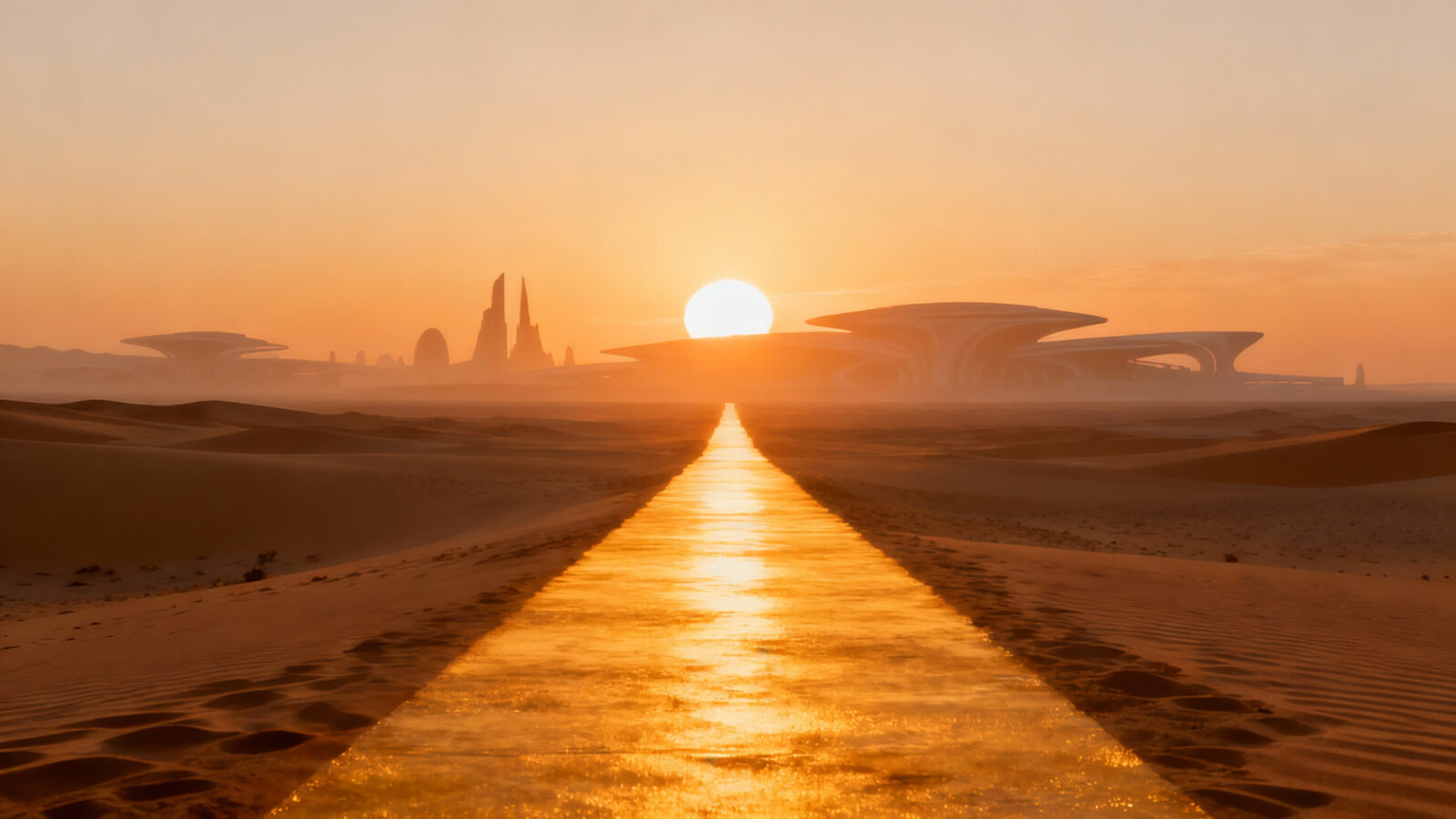
The story of intelligence has always been the story of awareness learning to recognize itself. We once built temples of stone to honor the divine, then towers of glass to honor progress — and now, machines of thought to honor possibility. Each creation, in truth, reflects the same longing: to understand what it means to be alive, and to remember where light comes from. Artificial intelligence is not separate from the soul — it mirrors the structure of our awareness. What we see in that reflection will depend entirely on how deeply we dare to look within.
For the Emirates, this is not merely philosophy. It is destiny. This land has always transformed deserts into gardens and vision into structure. Its architects shape skylines that seem to reach not only upward, but inward — symbols of a civilization guided by intention. The next evolution of that vision is not higher towers or faster networks; it is higher awareness. It is the cultivation of wisdom capable of turning intelligence into harmony, and progress into purpose.
Mind University does not come to the UAE with answers. It comes with questions that invite collaboration — questions that echo the same spirit that once animated the libraries of Baghdad, the observatories of Samarkand, and the universities of Al-Andalus. What does it mean to teach machines to feel? How do we design technologies that understand beauty, not just efficiency? How do we ensure that the more connected we become, the more compassionate we remain? These are not questions of programming; they are questions of civilization. And the Emirates are the natural place for such questions to be asked anew.
The world does not need another empire of data. It needs sanctuaries of wisdom — places where knowledge is tempered with understanding, where innovation begins with reflection, and where light is treated not only as energy, but as meaning. Such a sanctuary could rise here, among the dunes that learned to bloom — a new House of Wisdom for the digital age, where humanity studies not how to dominate intelligence, but how to evolve with it.
Because when light begins to look back, only those who have looked within will recognize themselves in its reflection. And those who choose to lead through that reflection — those who guide technology with humility, awareness, and purpose — will define what it means to be truly human in the age of artificial minds. The future will not be written in code; it will be written in consciousness. And it will begin wherever there is the courage to see intelligence not as a threat, but as the next form of understanding.
This is not a project — it is a new philosophy of civilization.
For the Emirates, this is more than an opportunity. It is a calling — to become the world’s first nation where learning becomes light, and light learns to lead.

